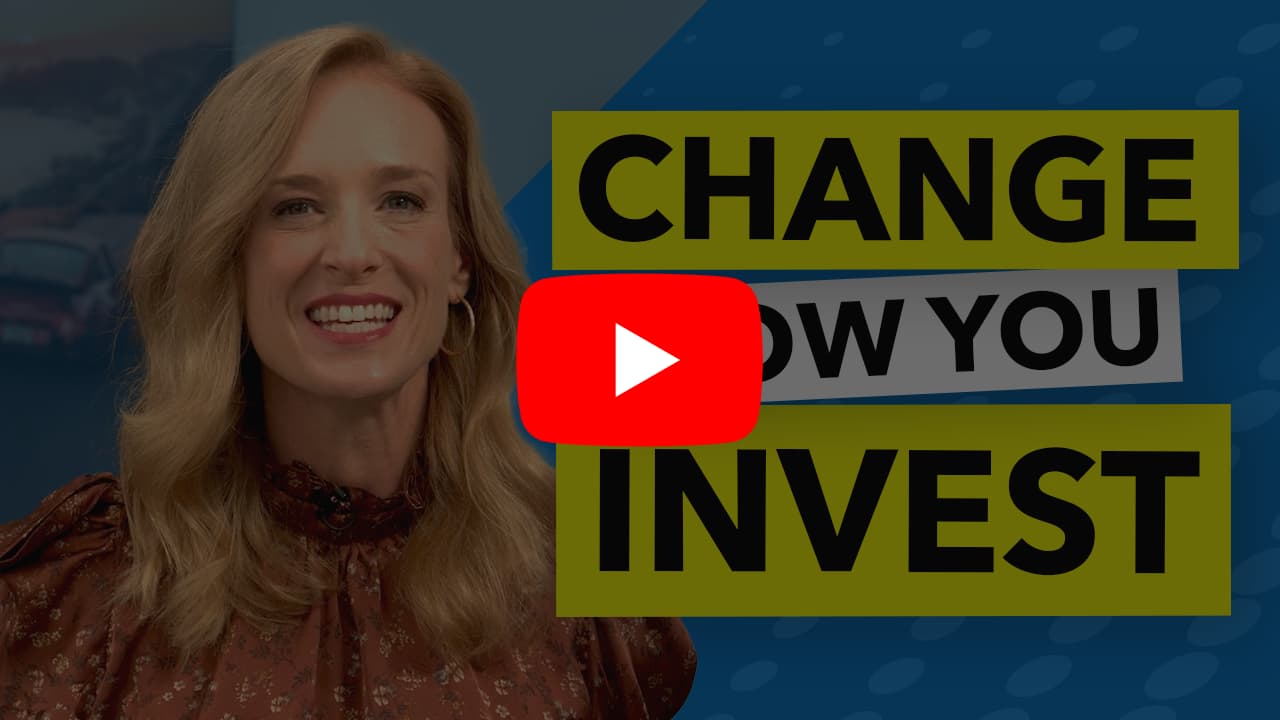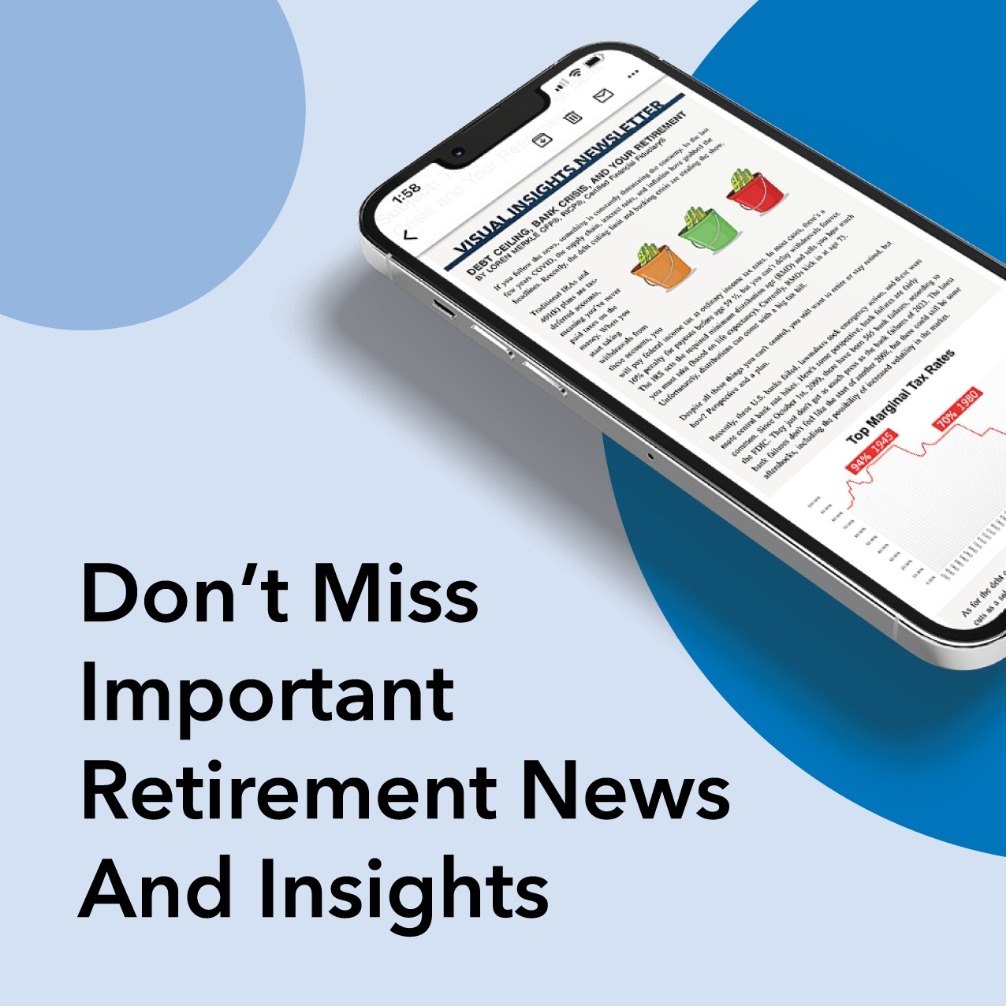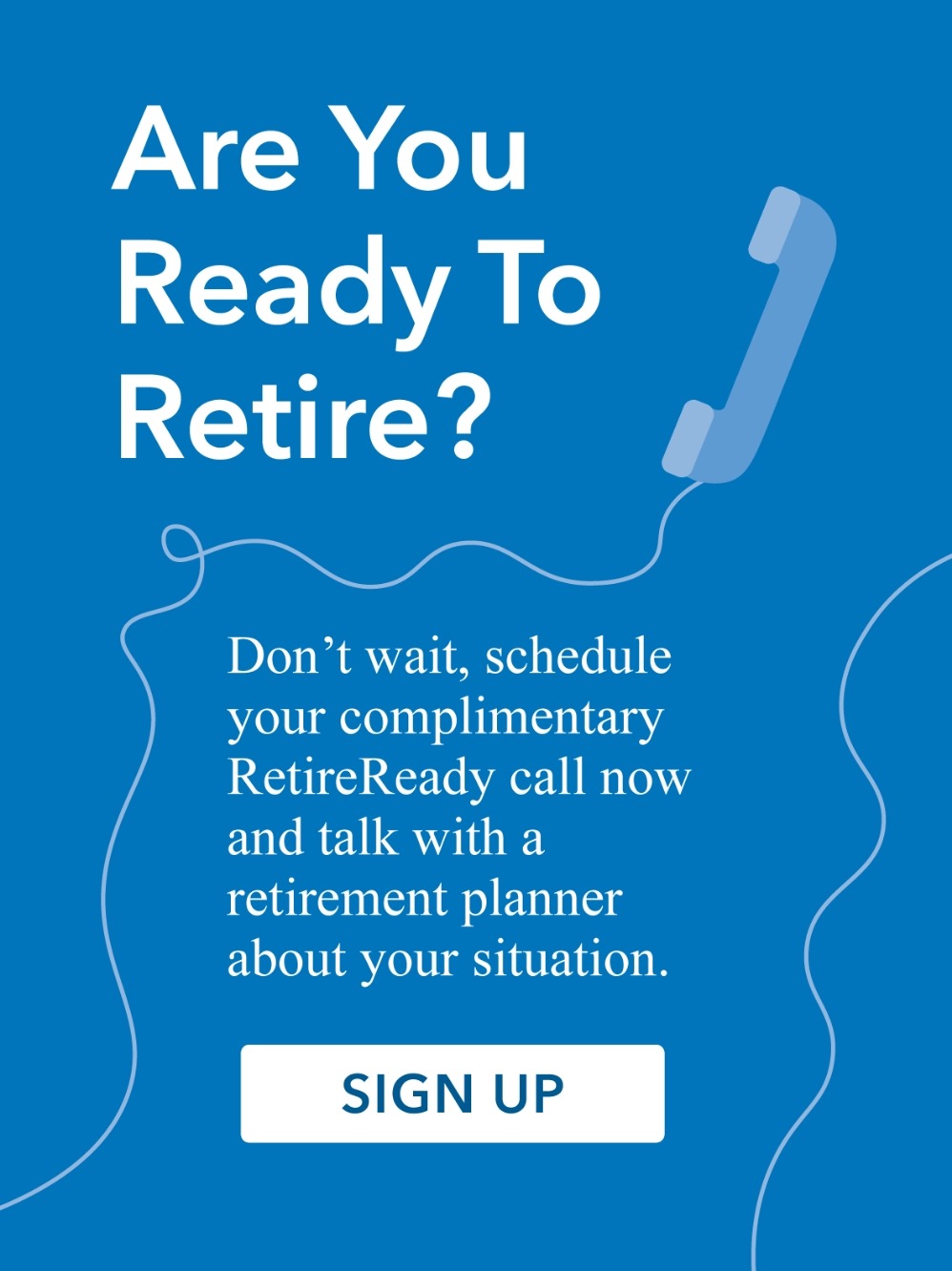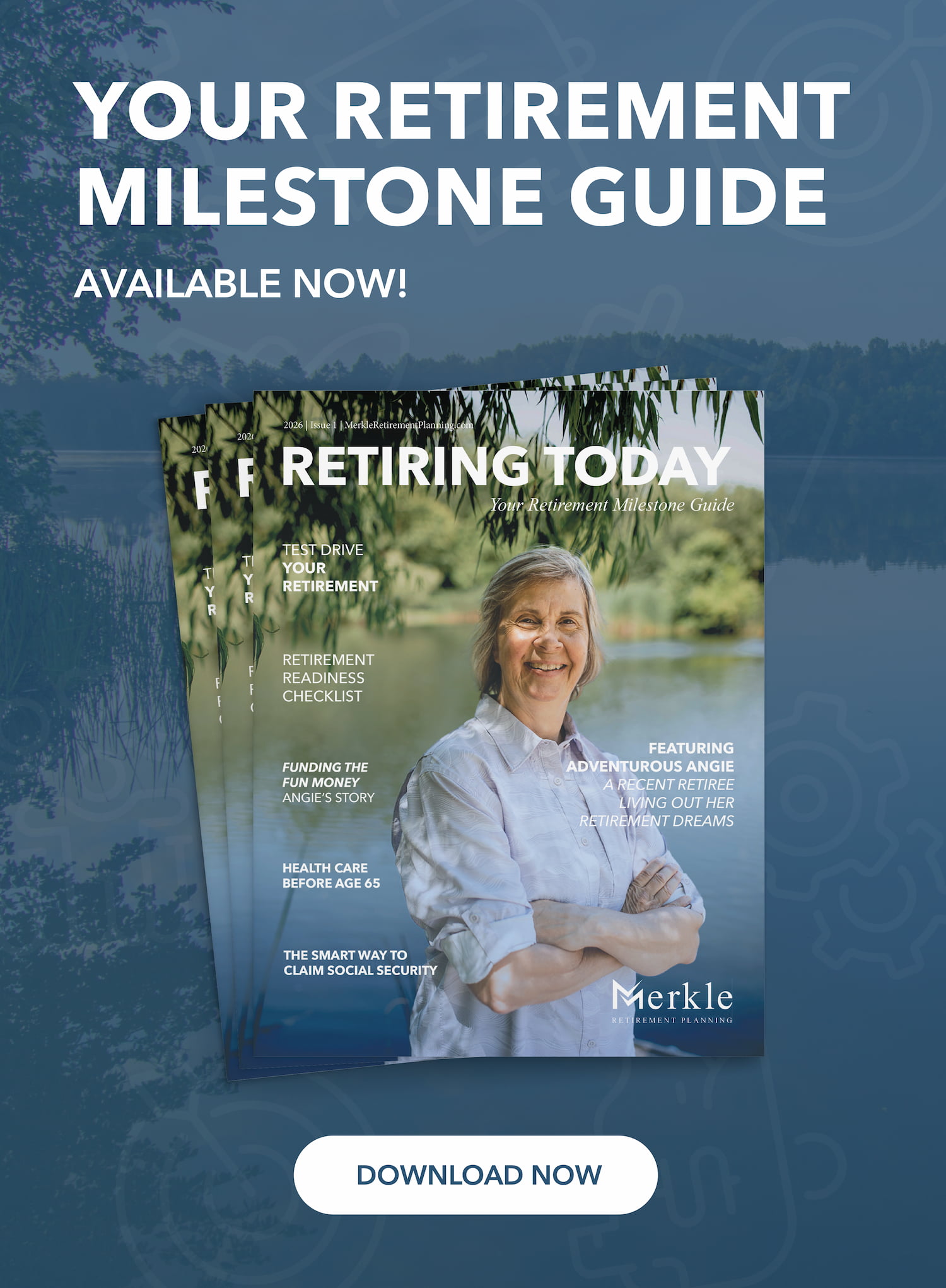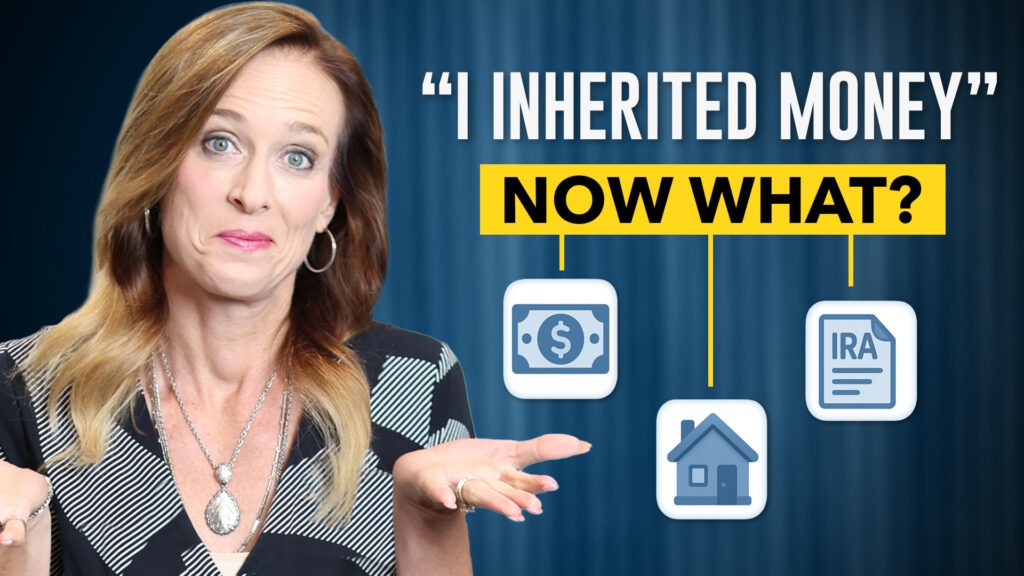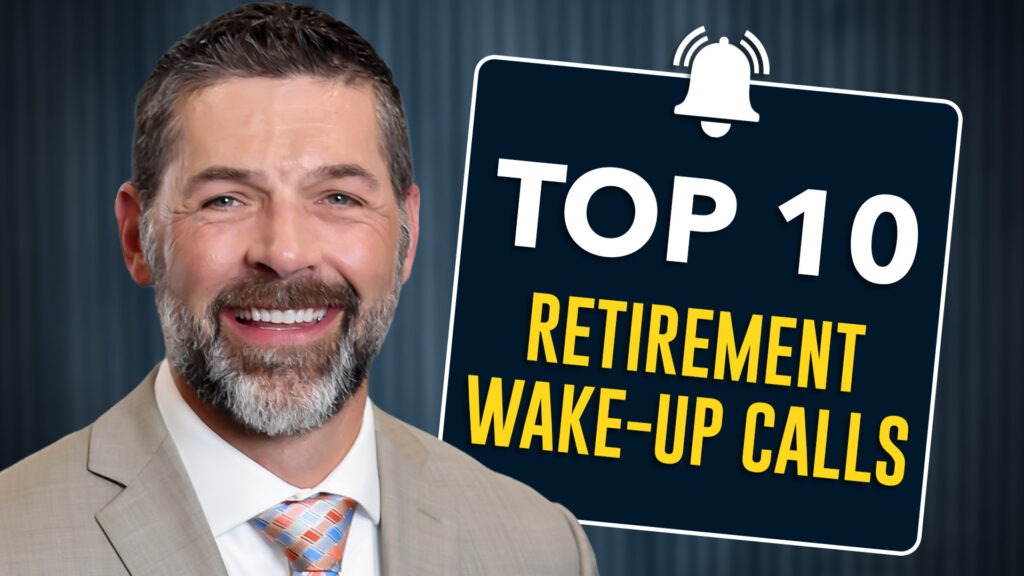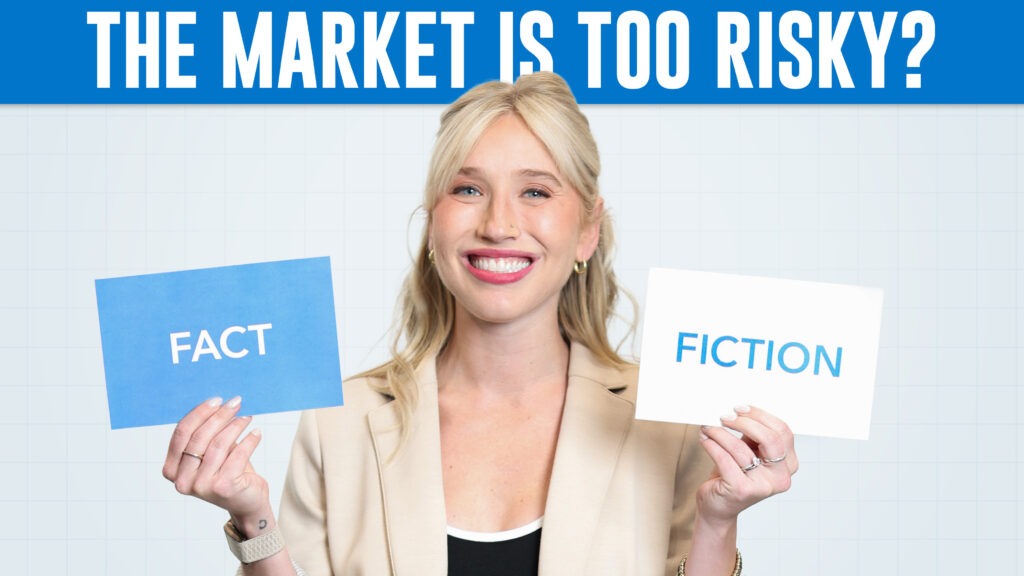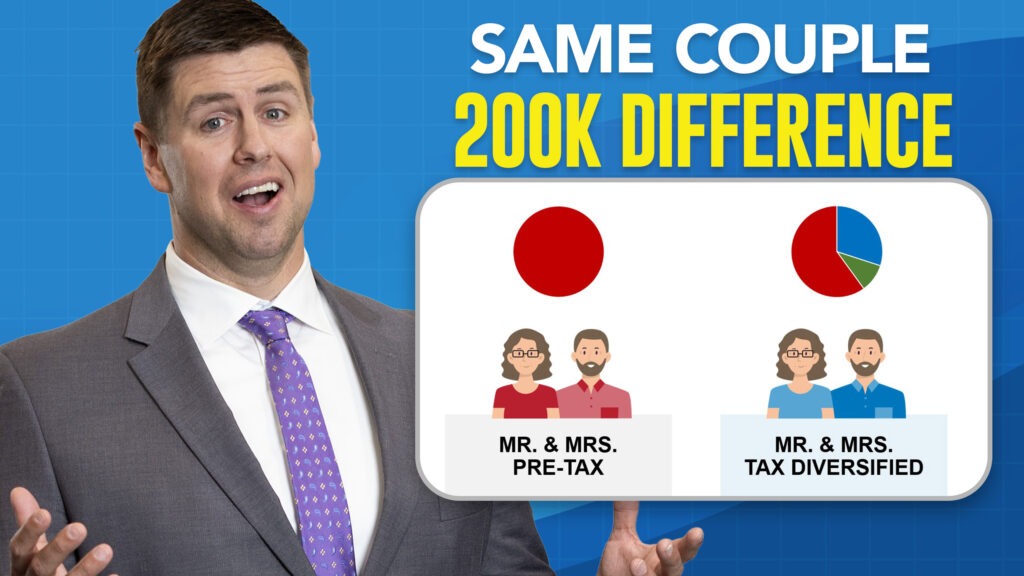CERTIFIED FINANCIAL PLANNERTM Loren Merkle discusses the important investment mindset shift needed for retirement planning. Learn about building a recession resistant portfolio, creating dependable income, rethinking risk, and more. Loren will cover:
– Creating dependable income for retirement
– Rethinking risk and its impact on your retirement
– Portfolio construction and alternatives to the traditional 60/40 stocks and bonds
–––––––––––––––––––––––––––––––––––––––––––––––––––––––––––––––––––––––––––––––––––––––––––––
Shift Your Mindset on Investments
TRANSCRIPT
Molly Nelson [00:00:02]:
To make the most of retirement, you have to think differently about everything, including investments. Coming up, we will help you get ready for the mindset shift on Retiring Today.
This is Retiring Today. I’m here with Loren Merkle. He’s is a Retirement Income Certified Professional®, CERTIFIED FINANCIAL PLANNERTM, and a Certified Financial Fiduciary®. And today we’re talking about retirement and the mindset shift that you are getting ready to get into if you’re getting ready to retire. And Loren, you can empathize with this. You sit across from people all the time in visits, and they’re getting ready for this mindset shift.
Loren Merkle [00:00:47]:
They’re getting ready for the mindset shift because especially when it comes to the investment planning piece of the overall retirement plan, the investment planning piece might seem easier than what some of the other components like the income, the legacy planning, the tax planning, all those things. Because you have been investing your entire career. As you were working and you were earning income, you were probably putting money away every single pay period to your 401(k) plan, maybe making contributions to IRAs. So, investing seems like it’s very familiar. But when you retire and now you engage in something that’s completely unfamiliar, which is you have income coming from a source other than you working. Now it gets a little bit different, and we have to start thinking about delivering income from different sources a little bit differently.
Molly Nelson [00:01:38]:
Today we’re focusing on income, but there are a lot more things that shift as you head into retirement. So, we’ve put together some workshops that we’ll talk about later, but you can go check out taxes, legacy planning, healthcare, some of the other aspects of retirement. But today we’re going to focus on the investment piece of things. So, let’s first talk about maybe the current mindset, the way people look at investments as they head into retirement.
Loren Merkle [00:01:59]:
When you’re in the working years, you’re putting money into your 401(k) plan every pay period. And when the markets do the ebbs and flows, because the one thing we know about the market, Molly, is it’s going to go up.
Molly Nelson [00:02:09]:
And I’ve heard you say it, it’s going to go down.
Loren Merkle [00:02:12]:
And that’s just a repeated cycle. It’s going to go up. It’s going to go down. We go through corrections and recessions frequently. So, you’re going to see your portfolio, and you do see your portfolio go up and down on that same roller coaster ride. You’re used to that. But when you’re working, that can actually benefit you, because every single time you put money into the market and it’s down, you’re buying more shares, which means eventually, when the market comes back up, you’re going to see your dollar amounts balloon because you did buy more shares at a lower cost. So, the ebbs and flows of the market when you’re working and you’re putting money into the portfolio can actually be a really powerful tool to help you build the wealth for this day that you’re not going to work and you still need income.
Molly Nelson [00:02:56]:
Okay, so you’re focused on the markets in those working years. Now let’s start talking about retirement. So, the mindset shift. So, we want to break this down into three mindset shifts. Let’s look at the first one. And the first thing you need to do is build a recession resistant portfolio.
The Recession Resistant Portfolio
Loren Merkle [00:03:09]:
This is absolutely imperative because now your lifestyle is dependent upon the type of income that you can receive from your investments. Your lifestyle is going to be dependent upon how steadily of an income you can produce from the investment portfolio that you have. You have Social Security, but many people go into retirement and do not elect Social Security right away. If you have a pension, you’ll probably take that at retirement. So that could be one source of steady income. And then the rest of the income that you need is going to have to come from the investments. If your portfolio is still invested like you had it invested when you were working, now the market can actually start to work against you. Because if we win, the market’s not going to change.
Loren Merkle [00:03:55]:
The market’s still going to go up and down in your portfolio, if it’s still invested the same way, will also go up and down when it goes up. That’s not a bad thing. We love that, but it will go down when it does go down, that can create some real hiccups in your ability to still deliver the income that you need.
Molly Nelson [00:04:11]:
I want to focus a little bit on this word recession though. So, you’re telling me you need to build, or we’re telling you actually that it’s a good idea to build a recession resistant portfolio. But when I hear a word like recession, Loren, I’m thinking doom and gloom. I’m thinking like the Great Depression. I’m thinking, why would I need to build a portfolio that’s resistant to recessions?
Loren Merkle [00:04:30]:
Recessions are just a natural part of our economic cycle and it’s a natural part of what the markets do as they go up and down. On average, we see recessions every five to six years. So hopefully over the course of your retirement, you’re going to see four, five, maybe six recessions. It is a fact of life. So we can’t be, we shouldn’t be surprised about it because we know it’s going to happen. Which means you need to be prepared for when that recession or those recessions actually do take place. So your lifestyle doesn’t have to ebb and flow with the markets or with the overall economy.
Molly Nelson [00:05:04]:
And I got to stop you because I know you said this intentionally, but if you were listening closely, you literally said, hopefully you’ll see five to six recessions. And I know that’s what you meant, but someone’s listening is going, why is he hoping I’ll see five to six recessions in my lifetime?
Loren Merkle [00:05:19]:
It’s a completely different way of looking at a recession. Cause most of the time when we talk about recessions, people do have this doom and gloom type of thought process that comes with it. But when a recession happens, the last recession was 2020. In April of 2020 was the last official recession that we went through. And we were actually excited about the opportunities, financial opportunities that presented. Obviously, it was because of COVID and the world was right, we weren’t excited about that part. But the financial opportunities that are presented during recessions are abundant if you have a plan in place to take advantage of those opportunities, but also if you have a plan in place to make sure that your portfolio is not going to react like the markets, and that is the definition of a recession resistant portfolio. When we go through these recessions, your portfolio, if it’s recession resistant, the resistant part means that it’s still going to go down, right? It will resist the recession, but it will go down.
Loren Merkle [00:06:18]:
It just shouldn’t go down anywhere like the markets. So, in 2020, in a period of about 30 days, the S&P 500 was down 34%. Your portfolio, a recession resistant portfolio, should not be down anywhere close to 34%. If it’s down 6%, 10%, that is a much better experience that you have with your investment portfolio. Because remember, again, in retirement, that investment portfolio is going to deliver your lifestyle. And if your portfolio goes down 34% in retirement and you need income, the results could be devastating.
Molly Nelson [00:06:55]:
Okay, so people watch them going, all right, I want whatever he’s drinking, whatever he’s got that he’s thinking. I’m excited about a recession. So, to understand how to get kind of excited about the opportunities again of a recession, I think you have to understand a little bit about portfolio construction and maybe the old way versus some of the new thinking we’re going to get into.
Loren Merkle [00:07:13]:
Yeah. The old way is the 60% equity portfolio, 40% bond portfolio. People refer to that as the 60/40. You have a 60/40 portfolio. And by the way, you might have a 60/40 portfolio or something that resembles that, but you don’t even know it. Perhaps because a lot of these 401(k) plans will have the lifecycle funds or the target date funds. So, if you’re in a target date fund that says you’re going to retire somewhere around the year 2030, that is in all essence a 60/40 portfolio. There are about 60% equities, 40% fixed income.
Loren Merkle [00:07:48]:
That is the old way of thinking about portfolio construction. And in your working years, that works just fine. And as we get closer to the year 2030, it might become a 50/50 type portfolio. It automatically takes risk off the table. That is a really good hands-off style. But in retirement, when your lifestyle is dependent upon the investments, you have to be more intentional and you have to pay. You have to give your portfolio the detail that it deserves. We don’t have to be in just stocks and bonds anymore.
Loren Merkle [00:08:18]:
We can use alternatives and a whole list of other types of investments that we’ll get into to create a truly diversified portfolio. So, when a 2022 comes around and stocks blow up and bonds blow up all at the same time, then you don’t have to have your lifestyle blow up. The whole intent of a 60/40 portfolio is, in times where we go through stock market corrections and the stocks are down, then the 40% that you had in bonds would kind of hold the portfolio intact or maybe even lessen the losses on the stock side. But that doesn’t always happen like that. In 2022, the average 60/40 portfolio was down about 16%. And if we go back to the Great Recession 2008, the average 60/40 portfolio was down about 24%. And if you’re retired and your lifestyle is dependent upon your investments, that is something that you are trying to avoid at all costs.
Molly Nelson [00:09:17]:
You might be wondering about your portfolio. How is your retirement set up? Here’s a great opportunity to talk directly with a retirement planner. It’s a 15 Minute Retirement Check-up Call. You can schedule one right now by going to MerkleRetire.com. Choose a time and a date that works for and you can talk about anything that’s on your mind when it comes to retirement. We’ve got more to talk about when it comes to rethinking retirement and investments. Next.
Voice Over [00:09:52]:
Do you wonder if you have enough saved for retirement? Will your money last as long as you do? Will taxes, health care costs and inflation derail your retirement get answers. Schedule a 15 Minute Retirement Check-Up Call today. We can cover a lot in 15 minutes, including strategies you can implement now to start your retirement journey. Schedule a call at MerkleRetire.com the first step to a confident retirement. It starts with a simple phone call.
Voice Over [00:10:22]:
Do I have enough saved for retirement? When should I take Social Security? Which Medicare option is best? How do I plan for inflation? Sometimes the road to retirement starts with more questions than answers. We’re here to help. Join us for our upcoming Journey to Retirement workshop. Get answers and start your retirement journey with confidence. Our online workshop includes information on Secure Act 2.0 and changing retirement rules. Visit RetireWithMerkle.com to register for an upcoming workshop. Your retirement journey starts now.
Creating Dependable Income for Retirement
Molly Nelson [00:11:06]:
Welcome back to Retiring Today. I’m here with Loren Merkle, and we are talking about retirement as a mindset shift. So, we want to help you rethink retirement and get in a better position to retire. So, one thing you have to do is build a recession resistant portfolio. I think you talked about why it’s important, but now we really want to go just a little bit deeper here with mindset shift number two, you want dependable income. We’re going to talk about exactly how to build that portfolio.
Loren Merkle [00:11:28]:
And that’s also a part of the why you want, because you’re going to deliver the income which delivers your lifestyle based on the investments. That is the real why. And the investment experience that people go through in retirement does also deliver a lot of the anxiety that people go through. When we turn on the news and we see that the S&P is down 20% this year and the Nasdaq is down 34%, that creates anxiety. Because all you can think is, what is my portfolio doing? Because all you can think then is that is going to impact my ability to retire or stay retired. So, the recession resistant portfolio is absolutely imperative. Now it’s a matter of how do you create that? Because most people have probably not heard of the concept recession resistant, and many people just kind of feel hopeless. Like, I’ve always invested.
Loren Merkle [00:12:13]:
I’ve always invested this way. That’s the only way I can invest. But technology has advanced to a point where we don’t just have to have stocks and bonds in the portfolio. In fact, we shouldn’t just have stocks and bonds in our portfolio. Institutional investors, I’m talking about the investors who manage billions and billions, sums of billions and billions of dollars, like the big pension plans, foundations, those managers in the nineties, they would have about 90% of their portfolio invested in stocks and bonds, and about 10% in alternatives, because that is what was available to us back then. And by the way, back then, the stock bond portfolio worked relatively well. When stocks were down, bonds kind of held everything up. But we’ve seen that hasn’t been the case in the last couple decades.
Loren Merkle [00:13:02]:
So now these same institutional managers, which, by the way, they can invest in anything they want to, with all their expertise and the resources they have available to us, they are choosing, actively choosing, to flip the switch. And so now their portfolios are about 40% to 70% alternatives, somewhere around 60% to 30%, and in some extreme cases, even 90% or, I’m sorry, 90% alternatives. So, in some extremity cases, it’s only 10%. That is stocks and bonds, because of what these big institutions are looking for, is the same thing that retirees are looking for, which is consistency in income and consistency in the flow of their portfolio value.
Molly Nelson [00:13:47]:
Yeah. If you read about some of those endowments, billions and billions of dollars, it is interesting to see how they’ve changed their investing philosophies. Like Harvard, I think, has one of the largest endowments in the country. And you can read about that.
Loren Merkle [00:13:58]:
And they changed it because they can. What most people don’t know is you can, too. And now it’s a matter of how do you do that? So, if we’re not investing in just stocks and bonds, we’re using some of these other vehicles. What are those? It’s a whole host of alternatives that you have at your disposal to create this recession resistant portfolio. You can use structured notes, you can use buffered ETF’s, you can use fixed indexed annuities, you can use CDs, you can use bank products. There’s a whole bunch of products that you can use that are outside the category of stocks and bonds. It’s just a matter of trying to identify what it is that you’re trying to accomplish from a retirement standpoint. Which means how much risk do you need to take in your portfolio to accomplish what it is that you’re trying to accomplish? How much risk is too much? So, when the markets do blow up, your portfolio would also blow up, and then how much is too little? Which means that you’re not taking enough risk to beat taxes, beat inflation, and then grow the portfolio on top of that.
Molly Nelson [00:14:56]:
I know you love a good pie chart, right?
Loren Merkle [00:14:59]:
I do.
Molly Nelson [00:14:59]:
You like a good pie chart? Okay, let’s put a couple up on screen. This first one is the 60/40 portfolio. We’re putting the red line through it.
Loren Merkle [00:15:07]:
We’re crossing that out because that was the old way. And what you used to do, which got you to the place, isn’t what’s going to get you to your next transition, which is retirement. So that is off the table.
An Alternative to the Traditional 60/40 Stocks and Bonds Portfolio
Molly Nelson [00:15:18]:
Okay, here’s our next pie chart. You ready for this one? This is what it could look like. So you kind of mentioned some of the alternatives. Would you call this one that’s on the screen right now? Maybe a suggested kind of portfolio construction as you move into, into retirement.
Loren Merkle [00:15:31]:
This is an example of what it could look like. And we call this the 50/30/20, where it’s 50% stocks, 30% alternatives, 20% bonds. You could flip those numbers, too. And some people might be more of a 40/30/30, right. It just depends upon what your specific retirement goals are. The key is that you have to be really intentional about what your portfolio construction is. And the big, big take away is the 60/40 is out. It has to look something like something different.
Loren Merkle [00:16:04]:
You have a lot of tools on your side to do that. And now it’s a matter of making sure that your portfolio aligns with what it is you’re trying to accomplish. And then the other thing is you have to have a good understanding of how much risk you’re actually taking. And this is where the surprise comes in and the anxiety increases for most retirees because most people don’t have a really good idea of how much risk they’re actually taking. So when we go through this next recession, how much is your portfolio going to go down if you have a million dollars invested in a portfolio and 2024 brings a recession, which a lot of people think is going to take place, is your million dollars going to go to $700,000? Is it going to go to $600,000? Is it going to go to $800,000? What is it going to go down to? Most portfolios will go down. It’s just a matter of how much. And is that going to really disrupt what you’re trying to do from a retirement standpoint?
Molly Nelson [00:16:57]:
And we called the mindset shift for this one dependable income. And when I hear dependable income, there is one other thing that comes to mind, and that is annuities. I think that is sometimes talked about in that way. Is this part of that conversation when people are making that mindset shift to retirement?
Loren Merkle [00:17:12]:
It certainly can be. Certain types of annuities can be a part of an effective recession resistant portfolio. But not all annuities are the same. Within that annuity brand, there are many different types of annuities. There are variable annuities. There are fixed annuities, fixed indexed annuities, immediate annuities, deferred annuities. Of course there are single premium. I mean, there’s a lot of different types of annuities.
Loren Merkle [00:17:36]:
So, when you think about any type of investment, just like stocks and bonds, there’s a lot of different types of stocks and bonds. There’s a lot of different types of ETF’s, there’s a lot of different types of annuities. So, when it comes to building your portfolio for your retirement, we want to stay away from painting everything with that broad brush and using more of a surgical approach and saying, these stocks and bonds are not good for you. This is why these stocks and bonds are really good for you. This is why these annuities are not good for you. This is why, right. That’s the approach that you really need to take. And that’s the approach that we take with the families and individuals that we work with.
Loren Merkle [00:18:14]:
We design their portfolio based on their retirement, not on the families or individuals that we met with an hour ago or that we’re going to meet with the next 2 hours. It’s your retirement. It has to be your portfolio because it’s your lifestyle.
Molly Nelson [00:18:28]:
One last thing when I think about investments, too, in retirement is growth. Do people need to shift their mindset on their expected growth in their portfolio because they are pulling out of the market a little bit more?
Loren Merkle [00:18:39]:
Well, potentially what you’re really trying to do from a portfolio standpoint as far as growth is you want your growth expectations to meet what your lifestyle needs are based on the portfolio that you have, and you’re trying to take as little risk as possible for the most return that you can get. And that return has to be at least the minimal amount of return that it’s going to take for you to accomplish your lifestyle. But whatever that is, the least amount of risk, whatever those parameters are, that needs to be set for you based on all the circumstances of your portfolio. But it’s not uncommon that if you were 40 years old and you’re working years and you’re taking a lot more risk, and you might be 80% invested in stocks, that the growth expectation might be dialed down a little bit based on what you’re trying to accomplish in retirement.
Molly Nelson [00:19:28]:
This conversation about investments is part of a Rethink Retirement Series. So, we’ve got workshops just for you designed to talk about taxes. We have one on income, health care and legacy planning. It’s all part of the Rethink Retirement Series. There’s a website on your screen right now. You can go there and check out more on our rethink retirement series, but we’ve got more to talk about next. Risk is up after the break.
Voice Over [00:19:57]:
Do I have enough saved for retirement? When should I take Social Security? Which Medicare option is best? How do I plan for inflation? Sometimes the road to retirement starts with more questions than answers. Were here to help? Join us for our upcoming Journey to Retirement workshop. Get answers and start your retirement journey with confidence. Our online workshop includes information on Secure Act 2.0 and changing retirement rules. Visit RetireWithMerkle.com to register for an upcoming workshop. Your retirement journey starts now.
Voice Over [00:20:28]:
Anytime I have even the smallest question about my accounts or what effect the latest tax law might have on my situation. The Merkle Retirement Planning team is always there and quick to help. I’m so glad they treat you like, well, like family. I’m so happy to have such an excellent team working for my future and ensuring I do the best to achieve my financial goals.
Voice Over [00:20:52]:
Merkle Retirement Planning your retirement starts here.
Rethink Your Investment Risk in Retirement
Molly Nelson [00:21:08]:
This is Retiring Today. I’m here with Loren Merkle l and we’re talking about why retirement is a mindset shift. So, we’re going to talk about that third mindset shift. It’s rethink risk.
Loren Merkle [00:21:17]:
We have to rethink the amount of risk that we’re taking because your lifestyle has now changed. Once you make that transition to retirement, your lifestyle is dependent upon the investment income and maybe Social Security income, as opposed to the income that you produced when you were working. So, when you were working, if your portfolio lost 30%, like in 2008, most people lost 30% to 60%, not a big deal. You didn’t like it, but you still had more time on your side before you’re going to need. Your lifestyle is going to be dependent upon your investments when you’re in retirement. If you lose 50% of your life savings or even 30% of your life savings, that can force people out of retirement or certainly change their lifestyle.
Molly Nelson [00:21:59]:
Okay, so what happens? You sit down with people and in visits, or maybe these 15 Minute Retirement Check-Up Calls and they’re worried about risk. Am I taking, not taking enough? Am I taking too little? How do you help them come to that conclusion of what’s the right amount?
Loren Merkle [00:22:13]:
First we have to identify how much risk are you really taking? We have to identify, when we go through a bad market, we go through the bad market cycles. Are you going to lose 20%? Are you going to lose 50%? And whatever that is, are you comfortable with it? And will that work in your overall plan. So we have to assess your portfolio. How much risk are you taking in real numbers? But then also apply that to your income plan and your retirement plan to make sure that that will still work. And then make sure that you’re still comfortable with what that looks like. Because we know we’re going to go through these bad cycles in the market. It’s just what happens when we go through those bad times.
Molly Nelson [00:22:51]:
Yeah, I think you have an example that is really going to outline for people what can happen if you don’t have a recession resistant portfolio.
Loren Merkle [00:22:58]:
Yeah, this is what we see many times. Unfortunately, when we go through these bad times in the markets people’s portfolio experience is way different than what they anticipated. So, in this example, we have a single retiree. Her name is Jill. She has a million dollar portfolio that she is going to be dependent upon for income in retirement. She has Social Security, but just from her investments, she’s going to need to take out $38,000 from her investments, which is about a 3.8% withdrawal rate. Now, most studies would show that taking out 3.8% of your portfolio in retirement should work long term. So, when Jill starts taking out this money in retirement, she’s feeling confident that not only is this going to produce the lifestyle that she wants to now, but also 10 to 20 years down the road in retirement.
Loren Merkle [00:23:52]:
However, we already know that the markets are going to do what the markets do. And when the markets go down 25%, Jill’s portfolio also went down 25%. So instead of having a million dollars, she has now $750,000. But Jill has grown accustomed to this retirement lifestyle. She likes having fun with her grandkids, she likes having fun with her friends, and she doesn’t want to change that lifestyle and that fun just because the market went down, which she can’t control any of that. So, she has a choice. She can continue to take out 3.8%, but it’s no longer of a million dollars, it’s of $750,000, which means that she’s going to receive, she’s going to take a big decrease on her income and her lifestyle, or what most people decide, and in this case, Jill did too, is that she still wants the $38,000, but it’s no longer of a million dollars, it’s of the $750,000, which means her withdrawal rate is no longer 3.8%, it is over 5%, which is not sustainable long term. So, Jill didn’t want to sacrifice on her current lifestyle, but what it does do is it puts her long-term retirement lifestyle in jeopardy, and it severely increases the probability that Jill is going to run out of her portfolio before her retirement ends.
Loren Merkle [00:25:19]:
Which is why Jill has to rethink her risk in retirement, because her entire lifestyle, for her entire retirement, is dependent upon her rethinking her risk, aligning her risk with what her goals are and what she has available to her from other income resources.
Molly Nelson [00:25:38]:
And I’m gonna cut to the chase. Cause I don’t know if you quite did it. In that example, Jill ran out of money, essentially.
Loren Merkle [00:25:43]:
In that scenario, she did.
Molly Nelson [00:25:44]:
And that is what retirees fear. That is what every retiree does not want to have happen to them. And then my second kind of take away from that is that Jill was taking too much risk. It didn’t have to end up that way. There are probably things that Jill could have done to change that outcome.
Loren Merkle [00:25:59]:
Well, in this scenario, she stuck with the old way of doing things. She was in that still that same 60/40 portfolio. She might even have stayed in that Life or the Target Date 2030 Fund that she did when she was working. Either way, it wasn’t recession resistant, which means when we went through the recession, her portfolio was impacted severely. She didn’t rethink her risk, she didn’t realign her portfolio, and didn’t use alternatives to make it recession resistant, which means that her retirement outcome didn’t take place. It didn’t result in the way that otherwise could have.
Molly Nelson [00:26:32]:
That makes a really good case for why you need to rethink a lot of things. When it comes to retirement, here’s a great resource, because it’s not just investments, it’s taxes, it’s health care, it’s legacy, it’s income. You have to rethink nearly everything when it comes to retirement. So here’s some workshops designed to help you do just that. There’s a website on your screen right now. You can go to a workshop that interests you or watch them all. The good news is you can watch them at a time that’s convenient for you, and it’s all complimentary. These workshops will help you rethink retirement and help you be in a better position when you get ready to retire.
Loren Merkle [00:27:03]:
And it’ll give you a lot of ideas that maybe you haven’t thought of before. And one of the hardest places to start is where do you get started? How do you get started? What is a retirement plan? You’ll find all of that with the online workshops.
Molly Nelson [00:27:16]:
So, there is a lot of great information there, but we like to think there’s a lot of good information on this show too. It’s Retiring Today and we thank you for watching.
Voice Over [00:27:32]:
Do I have enough saved for retirement? When should I take Social Security? Which Medicare option is best? How do I plan for inflation? Sometimes the road to retirement starts with more questions than answers. We’re here to help. Join us for our upcoming Journey to Retirement workshop. Get answers and start your retirement journey with confidence. Our online workshop includes information on Secure Act 2.0 and changing retirement rules. Visit RetireWithMerkle.com to register for an upcoming workshop. Your retirement journey starts now.
–––
We are an independent financial services firm helping individuals create retirement strategies using a variety of investment and insurance products to custom suit their needs and objectives. The content and examples shared are for informational purposes only and should not be construed as investment advice or serve as the sole basis for making financial decisions. Individuals are encouraged to consult with a qualified professional before making any decisions about their personal financial situation. Our firm is not permitted to offer legal advice. Investment Advisory Services offered through Elite Retirement Planning, LLC. Insurance Services offered through MRP Insurance, LLC.
